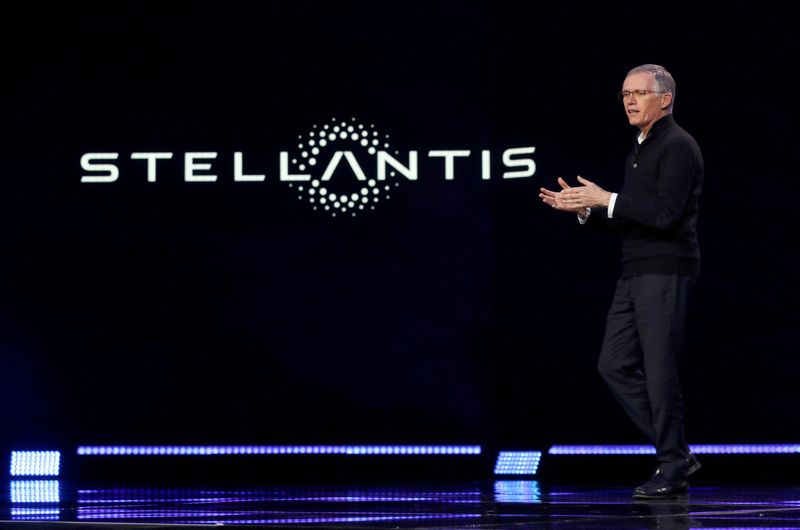By Abhirup Roy and Jarrett Renshaw
(Reuters) -Seven major automakers on Wednesday said they were forming a new company to provide electric vehicle charging in the U.S., in a challenge to Tesla (NASDAQ:TSLA) and a bid to take advantage of Biden administration subsidies.
The group includes General Motors (NYSE:GM), Stellantis, Hyundai Motor and its Kia affiliate, Honda, BMW and Mercedes Benz - brands representing about half of U.S. vehicle sales but a small share of the EV market dominated by Tesla.
The unusual coalition of competitors - that according to some lawyers might raise antitrust concerns - said the new joint-venture aims to roll out 30,000 chargers in North America, starting along major highways and in cities.
The automakers did not specify how much they would invest individually or collectively, but said they would be open to additional investment or participation from other companies, including outside the auto industry. A name for the venture was not announced.
"The investment will be far less through this partnership than building individual charging networks," said Akshay Singh, a partner at consultancy PwC Strategy&. "They also get to control the customer experience and collect data."
There are more than 30,000 fast-charging machines around the nation. Each can cost anywhere from less than $100,000 to more than $200,000 for the most powerful versions.
Industry executives familiar with the cost of chargers said establishing this venture could cost multiple billions of dollars.
The White House lauded the deal.
"We think this is an important step forward," White House press secretary Karine Jean-Pierre said. "It's creating new union jobs for installation and maintenance.
The Biden administration has set a target of hitting 500,000 chargers by 2030, an almost four-fold increase.
Tesla, which accounted for more than 60% of U.S. EV sales last year, has the largest network of fast-chargers with almost 18,000 Superchargers.
Tesla said earlier this year it would open part of that charging network to EVs from rivals in order to be eligible for a share of funding from $7.5 billion in federal subsidies.
CHARGING LEADER TESLA
Tesla's lead in building out a network of chargers has given it sway in setting standards, something rivals have viewed with concern.
GM, Mercedes and others have signed on to adopt Tesla-developing charging technology from 2025.
GM previously said it could save $400 million from getting access to Tesla's network. On Wednesday, it said the new venture was part of its effort to reduce cost and "won't change GM's existing commitments or collaborations."
The other automakers – Stellantis, Hyundai, Honda and BMW – have not committed to the Tesla technology known as the North American Charging Standard (NACS) and have product plans that rely on a rival known as the Combined Charging System (CCS).
The new charging company will support both charging standards but will compete with Tesla's network.
CEOs of the seven auto brands said a charging network built out like gas stations with restrooms, food service and retail operations would support a faster EV rollout.
Automakers, however, lack the necessary electricians or experience working with retailers, said Andres Pinter, co-CEO at installation and maintenance company Bullet EV Charging Solutions.
"It won't be easy for the automakers to catch up," he said. "But they do have boatloads of money to throw at the problem and should outsource that work."
The new venture would also compete against established charging companies, including Volkswagen (ETR:VOWG_p)'s Electrify America and EVGo.
Industry officials said the new venture might be structured similar to Ionity, which was founded in 2017 in Europe and counts VW, Daimler, BMW, Ford (N:F) and Hyundai as members.
Asked whether the new venture would raise antitrust concerns with, a spokesman for the group cited the joint statement where the companies said it was subject to regulatory approvals.
The Justice Department did not respond to a request for comment.
Andre Barlow, an antitrust attorney with Doyle Barlow and Mazard, said the Justice Department would likely review the deal despite White House support.

A common concern with joint ventures is that a legal collaboration could potentially lead to illegal coordination, like price fixing or dividing up markets, he said.
"There are antitrust risks. You have seven car manufacturers that are going to be getting together in terms of this joint venture," he said.